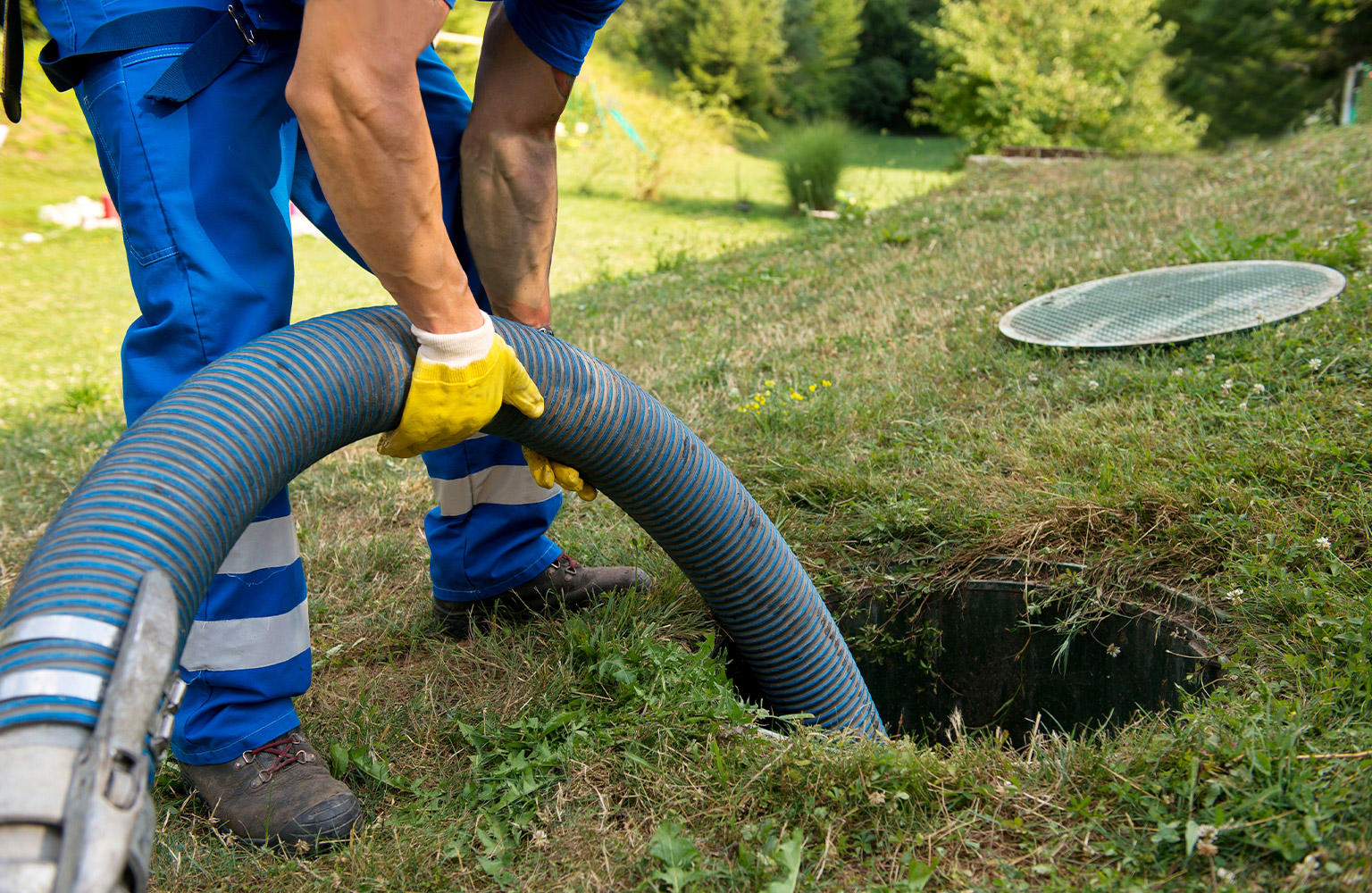
Wondering who to call for septic problems? Learn when to hire plumbers vs septic pros, warning signs, and average repair and pumping costs
Repairing your septic tank costs an average of $1,833


Average septic tank repair costs are $1,833, with most homeowners spending between $629 and $3,039.
Repair costs vary based on the part needing repair, tank material, and maintenance frequency.
Sewage odors, frequent backups, and standing water near the leach field are common signs that you need septic repairs.
Hiring a professional ensures safe, effective repairs and can prevent costly mistakes.
Regular maintenance helps detect issues early and extends the life of your septic system.
This article was updated using automation technology and thoroughly reviewed for accuracy by HomeAdvisor Editor Ryan Noonan.
Septic tank repair is essential for maintaining your home's wastewater system, and costs can range from $629 to $3,039, with an average of $1,833. Factors such as tank size, parts, and materials impact the overall expense. Budgeting accordingly and hiring a professional ensures efficient and long-lasting repairs.
On average, septic tank repairs cost $1,830, or between $629 and $3,038. However, major septic repairs can run $6,500 or more. If you need to call in a septic tank tech to diagnose the issue, expect to pay about $100 to $200 for a standard inspection or $250 to $1,175 if a camera inspection is required.

Parts make up a significant portion of your septic tank repair tasks. This is a breakdown of repair costs by part.
| Part | Average Cost Range |
|---|---|
| Baffle | $300–$900 |
| Pump | $250–$1,000 |
| Filter | $200–$300 |
| Line | $1,000–$4,200 |
| Tank | $165–$6,500 |
| Lid | $150–$500 |
Repairing a baffle costs $300 to $900, depending on how hard it is to access. The baffle is essential because it prevents solid waste from clogging the inlet and outlet pipes of your septic tank, ensuring your system flows smoothly.
You’ll pay about $250 to $400 to repair your septic pump. If the pump is beyond repair, a replacement costs $1,000 or more. The septic pump moves wastewater from your tank to the drain field. Common issues include electrical problems, lack of proper maintenance, or physical damage (like a vehicle driving over it). Ensuring your pump is in good working order keeps your system running smoothly.
While you're at it, it’s a good idea to check your filters for blockages or general wear and tear when repairing your pump.
A septic tank filter replacement costs between $200 and $300. The filter plays a crucial role by preventing solid substances from entering your leach field, reducing the risk of clogs. Having a new, working filter not only helps your system run efficiently but also ensures cleaner wastewater, benefiting the environment and prolonging the life of your septic system.
A broken pipe will cost about $600 on average. A cracked or broken lateral line can cost from $1,500 to $5,000. Damage to these lines can cause leaks and contamination. Preventing heavy loads over your drain field, such as parking heavy machinery or vehicles, can help avoid pipe damage.
If your lid is damaged, you’ll need to replace it for $150 to $500. The lid is important because it prevents debris from entering the tank and keeps gases and smells contained. A secure lid also ensures safety by preventing accidental access to the tank.
There are three types of tanks: plastic, concrete, and fiberglass. Plastic tanks are more affordable but susceptible to damage. Concrete tanks will withstand environmental changes but are more expensive to buy and install. Depending on your tank’s material, repairs will range from$150 to $7,500.
Plastic septic tank repairs are usually the most affordable and range from $150 to $2,000, including labor. These tanks are watertight and resist corrosion and rust. Their flexibility means they're less likely to crack—a common issue with other tank materials—saving you money on potential repairs.
Concrete tank repairs cost $700 to $5,000. These tanks are heavy and long-lasting, providing durability for your septic system. However, if your concrete tank is damaged, repairs can be more challenging. Also, concrete tanks may corrode over time, so regular inspections are important to catch issues early.
Fiberglass tanks cost $750 to $7,500 to repair. These tanks are resistant to rust and cracks, offering durability for your septic system. However, because they're lightweight, it's important to handle them carefully during installation to avoid damage.
Regular septic tank maintenance helps homeowners detect potential repairs at the first signs of damage to prevent unnecessary and costly repairs. Maintenance helps prevent clogs and keeps the layers inside the tank at reasonable levels. However, leach fields won't last forever—the average lifespan of leach fields is 15 to 25 years.
Tank pumping costs can skyrocket rapidly in an emergency. Adding products such as Rid-X can help the naturally occurring bacteria in your tank break down solid waste, preventing clogs and backups that can require an emergency pump-out.
A septic system inspection costs$100 to $200 for a standard assessment. A tech will check your pipes, tank, pump, and leach field. Some septic companies include this as part of their annual maintenance services. If a camera inspection is required, expect to pay between $250 and $1,175.
One-time septic tank pumping costs $290 and $550 on average. It’s best to pump it every three to five years. Most services also refer to tank pumping as tank cleaning, but they are not the same. Pumping requires a hose to grab liquid and any solids or sludge floating on the top of the tank. Cleaning drains all of the water and cleans any debris stuck to the bottom of the tank. This prevents scum and sludge buildup and provides an opportunity to inspect the system for potential issues.
With the exception of bacteria maintenance, we don’t recommend DIY septic tank cleaning or pumping. It’s best to let a pro navigate their heavy machinery and care for your system properly.
While tackling septic repairs yourself might seem cost-effective, it's important to consider the risks. Septic system work can be dirty and dangerous, requiring a detailed understanding of the system's components. Improper repairs may lead to leach field failure, which can cost up to $20,000 to fix.
Hiring a professional ensures the job is done safely and correctly, saving you time and potentially significant expense. Hire a local septic tank cleaning company to maintain your system each year.
No place is more important than your home, which is why HomeAdvisor connects homeowners with local pros to transform their houses into homes they love. To help homeowners prepare for their next project, HomeAdvisor provides readers with accurate cost data and follows strict editorial guidelines. We surveyed thousands of real customers about their project costs to develop the pricing data you see, so you can make the best decisions for you and your home. We pair this data with research from reputable sources, including the U.S. Bureau of Labor Statistics, academic journals, market studies, and interviews with industry experts—all to ensure our prices reflect real-world projects.
From average costs to expert advice, get all the answers you need to get your job done.

Wondering who to call for septic problems? Learn when to hire plumbers vs septic pros, warning signs, and average repair and pumping costs

Budget for well pump repair costs based on factors such as parts and components, location, pump type, labor, inspections, and more.

When calculating the cost to pump a septic tank, you need to consider the size of the tank, how often it needs to be pumped, and the maintenance of the tank.

Use this guide to budget for a septic system inspection based on cost factors such as inspection type, accessibility, and additional septic services.

If you need to replace your well pump, you should budget based on the well pump type, size, and labor rates in your area.